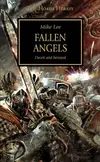
Nick Frichette

Fall Angels reunites readers with the Dark Angels Legion, the stoic sons of the enigmatic Lion El’Jonson, at a moment of quiet fracture. Lee brings welcome urgency and clarity to a story split across two theaters: Caliban, the Legion’s increasingly unstable home world, and the greater galactic war where loyalties begin to fray. The prose moves with the confidence of a writer more at ease in this mythic world than his predecessor, Mitchell Scanlon, and the result is a brisker, sharper narrative.
While Descent was largely a parochial coming-of-age tale, Fallen Angels throws its characters into the moral furnace of civil war. There’s betrayal, ambition, and the weight of choices made in darkness; hallmarks of the Heresy series at its best. A standout is the novel’s portrayal of Luther, once sidelined, now rendered with tragic pathos as his disillusionment with the Imperium deepens.
And yet, for all its improvements and martial drama, Fallen Angels suffers from a familiar sin among Heresy entries: dispensability. Though entertaining, it occupies a cul-de-sac in the wider narrative. Key revelations about the Dark Angels’ schism are hinted at but never fully realized, and the novel’s events ripple only faintly through the rest of the series. For those deeply invested in the lore of Caliban and its doomed sons, it’s a rewarding read. For others, it may feel like a detour from more consequential campaigns.
Still, in a series as vast and intricate as the Horus Heresy, not every tale must bear the weight of destiny. Fallen Angels may not shift the stars, but it holds its sword steady—and sometimes, that’s enough.
Horus Heresy Bolter or Bin Rating: Bin (Just not that important to the overall narrative)
Fall Angels reunites readers with the Dark Angels Legion, the stoic sons of the enigmatic Lion El’Jonson, at a moment of quiet fracture. Lee brings welcome urgency and clarity to a story split across two theaters: Caliban, the Legion’s increasingly unstable home world, and the greater galactic war where loyalties begin to fray. The prose moves with the confidence of a writer more at ease in this mythic world than his predecessor, Mitchell Scanlon, and the result is a brisker, sharper narrative.
While Descent was largely a parochial coming-of-age tale, Fallen Angels throws its characters into the moral furnace of civil war. There’s betrayal, ambition, and the weight of choices made in darkness; hallmarks of the Heresy series at its best. A standout is the novel’s portrayal of Luther, once sidelined, now rendered with tragic pathos as his disillusionment with the Imperium deepens.
And yet, for all its improvements and martial drama, Fallen Angels suffers from a familiar sin among Heresy entries: dispensability. Though entertaining, it occupies a cul-de-sac in the wider narrative. Key revelations about the Dark Angels’ schism are hinted at but never fully realized, and the novel’s events ripple only faintly through the rest of the series. For those deeply invested in the lore of Caliban and its doomed sons, it’s a rewarding read. For others, it may feel like a detour from more consequential campaigns.
Still, in a series as vast and intricate as the Horus Heresy, not every tale must bear the weight of destiny. Fallen Angels may not shift the stars, but it holds its sword steady—and sometimes, that’s enough.
Horus Heresy Bolter or Bin Rating: Bin (Just not that important to the overall narrative)